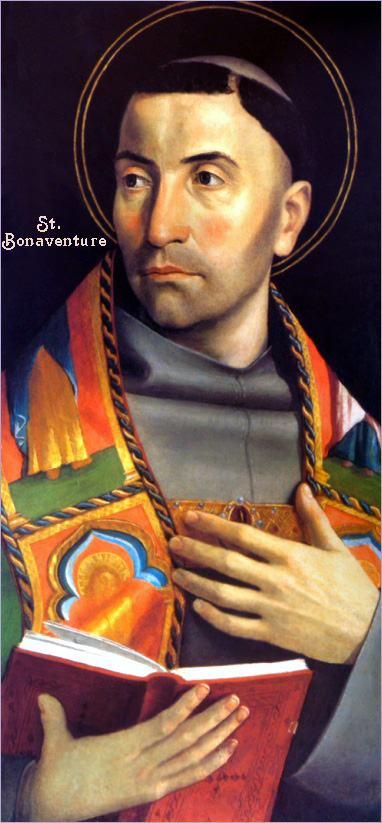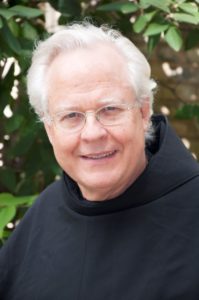 Fr. Edward J. Ondrako, O.F.M.Conv., Feast of St. Bonaventure, 15 July 2021
Fr. Edward J. Ondrako, O.F.M.Conv., Feast of St. Bonaventure, 15 July 2021
Theme:
“Wisdom I loved and sought after from my youth, as my bride.”
Wis 8, 2-7, 16-18;
Subtheme:
“We speak in words taught by the Spirit interpreting spiritual things in spiritual terms.”
1 Cor 2, 6-13;
Subtheme:
“You are the salt of the earth, you are the light of the world”
Mt 5, 13-19
Truth and the Justifying Power of the Subjective Conscience[1]
Who is the instructress of understanding God? How do I know each person’s innermost self? Sacred Scripture answers: With Wisdom. Today, few have doubts that America has potentially dangerous enemies to religious liberty. Some are in high places. Remember how Justice Amy Coney Barrett’s ascension to the High Court bench not long ago brought promise for the future of religious liberty in America?[2] What is religious liberty? What is truth? What is conscience? These questions call for a thicker development.
If I claim that the judgment of conscience is always right, that has to mean my own truth. How does my subjective truth fit into the broader world where we are all brothers and sisters? If we think it through, this brings human existence and freedom, into the realm of something deeper. Does truth align with the justifying power of the subjective conscience?
Today we find ourselves asking: what if a person takes the judgment of conscience to be always right? What if judgments of conscience contradict each other? First, it is undisputed that a person must follow a certain conscience, or at least not act against it. Second, we are at the core of the moral problem, existence itself, and the story of our own encounter with the problem of existence.
Being Christian is to recognize that God came to fulfill the law and the prophets, … not the smallest part of the letter of the law shall be done away with (Mt. 5, 18). God cares about everyone and allows many unbelievers in good conscience. A person in good conscience can still achieve salvation. Vatican II states: the Catholic Church (NA 2) rejects nothing of what is true and holy in the different peoples and different religions, but proclaims Christ as the way, the truth and the life (Jn. 1:6).
The high road to truth challenges. To retreat into oneself may seem comfortable but does it lead to the discovery of beauty that lies in truth? Is it an imposition to have faith as a Catholic in what constitutes redemption, even a kind of punishment? If God gifts a person with faith, believing and submitting to the faith of the Catholic Church gives rise to joy and the desire to pass the faith on. [Thank God my ancestors had joy and the desire to pass on the faith to me] Living triggers tensions. Often a so called erroneous conscience appears to make life easier, happier, and more human. It is a shock to wake up to say an erroneous conscience is a real grace of God, a normal course to salvation. An erroneous conscience shelters the person from the exacting demands of truth.
Truth connects to the essence of conscience. Great witnesses attest to the Christian doctrine of living according to truth and one’s conscience. St. John Henry Newman[3] is one who chose Catholicism not as a matter of personal taste or of subjective spiritual need, but was taken by the necessity to obey recognized truth as more important than personal preferences. He listened to all views, recognized consensus, but never at the expense of truth. He had no intention to become a Catholic.
Newman’s[4] view of the papacy and the primacy of conscience may be a huge surprise. To our new saint, the papacy is based on the primacy of conscience and guarantees it. To presuppose the opposition of authority to subjectivity is to have difficulty understanding that St. John Henry Newman stands on the side of subjectivity and expresses the very freedom of the person. The truth connects authority and subjectivity. For Newman, his pivoting point is the primacy of conscience.
Fifty years ago, the voice of conscience led me to accept the duties of the Catholic priesthood. When I was ordained, I was familiar with abstract moral principles such as an erroneous conscience. Living hammers abstract principles. For one, St. John Henry Newman’s thought is unequaled on the primacy of conscience vis-a-vis a counterfeit conscience. He said it is impossible to “put into a tea cup.” With the grace of God and Franciscan formation, St. Francis of Assisi, St. Clare, St. Anthony of Padua, St. Bonaventure, Bl. John Duns Scotus, and St. Maximilian M. Kolbe took deep roots and have been guides to recognition and respect of the personal quest for truth that every person has in life. Following in the tradition they laid down, as a priest, the primacy of conscience and recognition of error never left my pastoral care, especially when preaching.
In his long pastoral and writing career, Joseph Ratzinger, Pope Benedict XVI, has written about erroneous conscience with a tender heart. He analyzes in the context of tolerance, success, concern about one’s public standing and the need for the approval of public opinion at the expense of truth. These are concepts that a preacher or teacher ought never rush when trying to explain the Catholic Church’s teaching such as on the primacy of conscience. Haste can turn a person who is searching away not towards truth.
I share a story of rushing to explain Catholic teaching. I put my arguments in a “tea cup” that St. Newman warned about. Amy Coney Barrett who was not on the High Court yet, was at Mass with her family. I intended to help persons struggling to form conscience, but I confused them. Instead, I had justified the power of conscience at the expense of truth. First, conscience is not identical to personal preferences. Second, conscience cannot be reduced to some kind of personal or social advantage, or to fit in with group consensus, or to cave into political and social trends. I have never doubted that but on that particular Sunday night I dropped the ball by trying to say too much in too short a time. Justice Coney Barrett’s gentle head shake did not escape me.
Truth and the primacy of conscience in the Franciscan tradition, especially for St. Bonaventure and St. John Henry Newman, as an indisputable honorary Franciscan, guided every moment of their scholarly lives. Justice Amy Coney Barrett may never know that her subtle head gesture rightly challenged my words on conscience as using a “tea cup.” I respectfully thank her.
Living the Gospel, we learn the beauty of lessons about religious liberty, truth, and conscience, together. We are the salt of the earth, together, the light of the world, together, living in the city set on a hill, together. What we say and do cannot be hidden when we are together. If we break what appears to be the least significant of these commands and teach others to do so, we will become the least in the kingdom of God. If we fulfill and teach these commands, we shall be great in the kingdom of God (Mt 5, 19). In our post Christian culture, there is no other way to live the Gospel except together in faith.
Delivered on the Feast of St. Bonaventure, The Life Center, South Bend, IN.
eondrako@alumni.nd.edu
________________________
[1] Joseph Ratzinger, Faith and Politics (San Francisco: Ignatius Press, 2018), ch. 6: Truth, Values, Power, 95-130.
[2] Ken Starr, Religious Liberty in Crisis (New York: Encounter Books, 2021), see Appendix, 175-178.
[3] E. J. Ondrako, Rebuild My Church (Hobe Sound, FL: Lectio Publishing, LLC., 2021). ISBN 978-1-943901-18-0
[4] C. O’Regan, “Newman: Apostle of Fear and Trembling to Liberal Christianity” in Church Life Journal, McGrath Institute of Church Life at the University of Notre Dame (14 October 2019); “Newman and the Dis-Asters of Modernity” in C L J (10 October 2019). I endorse O’Regan as a most accurate and faithful interpreter of Newman. Proof is that he is a sought-after teacher of undergraduate and graduate students at the University of Notre Dame.
Fr. Edward J. Ondrako, OFM Conventual
Research Fellow Pontifical Faculty of St. Bonaventure, Rome
Visiting Scholar, McGrath Institute for Church Life
University of Notre Dame
July 15, 2021
